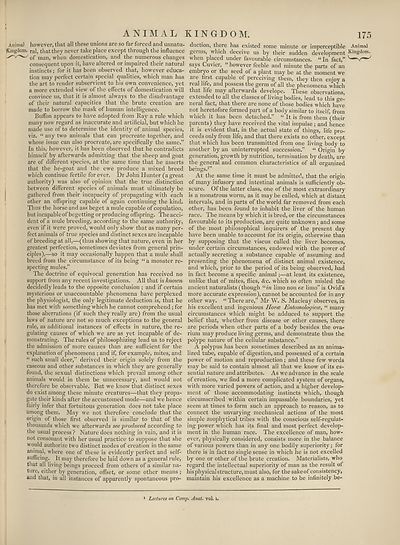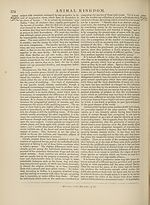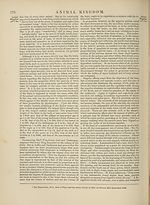Encyclopaedia Britannica > Volume 3, Anatomy-Astronomy
(183) Page 175
Download files
Complete book:
Individual page:
Thumbnail gallery: Grid view | List view

ANIMAL KINGDOM. 175
Animal however, that all these unions are so far forced and unnatu-
Kingdom. ral) that they never take place except through the influence
of man, when domestication, and the numerous changes
consequent upon it, have altered or impaired their natural
instincts; for it has been observed that, however educa¬
tion may perfect certain special qualities, which man has
the art to render subservient to his own convenience, yet
a more extended view of the effects of domestication will
convince us, that it is almost always to the disadvantage
of their natural capacities that the brute creation are
made to borrow the mask of human intelligence.
Buffbn appears to have adopted from Ray a rule which
many now regard as inaccurate and artificial, but which he
made use of to determine the identity of animal species,
viz. “ any two animals that can procreate together, and
whose issue can also procreate, are specifically the same.”
In this, however, it has been observed that he contradicts
himself by afterwards admitting that the sheep and goat
are of different species, at the same time that he asserts
that the he-goat and the ewe produce a mixed breed
which continue fertile for ever. Dr John Hunter (a great
authority) was also of opinion that the true distinction
between different species of animals must ultimately be
gathered from their incapacity of propagating with each
other an offspring capable of again continuing the kind.
Thus the horse and ass beget a mule capable of copulation,
but incapable of begetting or producing offspring. The acci¬
dent of a mule breeding, according to the same authority,
even if it were proved, would only show that as many per¬
fect animals of true species and distinct sexes are incapable
of breeding at all,—(thus showing that nature, even in her
greatest perfection, sometimes deviates from general prin¬
ciples),—so it may occasionally happen that a mule shall
breed from the circumstance of its being “ a monster re¬
specting mules.”
The doctrine of equivocal generation has received no
support from any recent investigations. All that is knoivn
decidedly leads to the opposite conclusion ; and if certain
mysterious or unaccountable phenomena have perplexed
the physiologist, the only legitimate deduction is, that he
has met with something which he cannot comprehend; for
those aberrations (if such they really are) from the usual
laws of nature are not so much exceptions to the general
rule, as additional instances of effects in nature, the re¬
gulating causes of which we are as yet incapable of de¬
monstrating. The rules of philosophizing lead us to reject
the admission of more causes than are sufficient for the
explanation of phenomena ; and if, for example, mites, and
“ such small deer,” derived their origin solely from the
caseous and other substances in which they are generally
found, the sexual distinctions which prevail among other
animals would in them be unnecessary, and would not
therefore be observable. But we know that distinct sexes
do exist among these minute creatures—that they propa¬
gate their kinds after the accustomed mode—and we hence
fairly infer that fortuitous generation does not take place
among them. May we not therefore conclude that the
origin of those first observed is similar to that of the
thousands which we afterwards see produced according to
the usual process ? Nature does nothing in vain, and it is
not consonant with her usual practice to suppose that she
would authorize two distinct modes of creation in the same
animal, where one of these is evidently perfect and self-
sufficing. It may therefore be laid down as a general rule,
that all living beings proceed from others of a similar na¬
ture, either by generation, offset, or some other means;
and that, in all instances of apparently spontaneous pro¬
duction, there has existed some minute or imperceptible Animal
germs, which deceive us by their sudden development Kingdom,
when placed under favourable circumstances. “ In fact,”
says Cuvier, “ however feeble and minute the parts of an
embryo or the seed of a plant may be at the moment we
aie first capable of perceiving them, they then enjoy a
real life, and possess the germ of all the phenomena which
that life may afterwards develope. These observations,
extended to all the classes of living bodies, lead to this ge¬
neral fact, that there are none of those bodies which have
not heretofore formed part of a body similar to itself, from
which it has been detached.” “ It is from them (their
parents) they have received the vital impulse ; and hence
it is evident that, in the actual state of things, life pro¬
ceeds only from life, and that there exists no other, except
that which has been transmitted from one living body to
another by an uninterrupted succession.” “ Origin by
generation, growth by nutrition, termination by death, are
the general and common characteristics of all organized
beings.1”
At the same time it must be admitted, that the origin
of many infusory and intestinal animals is sufficiently ob¬
scure. Of the latter class, one of the most extraordinary
is a monstrous worm, as it may be called, wffiich at distant
intervals, and in parts of the world far removed from each
other, has been found to inhabit the liver of the human
race. The means by which it is bred, or the circumstances
favourable to its production, are quite unknown; and some
of the most philosophical inquirers of the present day
have been unable to account for its origin, otherwise than
by supposing that the viscus called the liyer becomes,
under certain circumstances, endowed with the power of
actually secreting a substance capable of assuming and
presenting the phenomena of distinct animal existence,
and which, prior to the period of its being observed, had
in fact become a specific animal;—at least its existence,
unlike that of mites, flies, &c. which so often misled the
ancient naturalists (though “m limo non ex limo” is Ovid’s
more accurate expression), cannot be accounted for in any
other way. “ There are,” Mr W. S. Macleay observes, in
his excellent and ingenious Horee Entomolpgicce, “ many
circumstances which might be adduced to support the
belief that, whether from disease or other causes, there
are periods when other parts of a body besides the ova¬
rium may produce living germs, and demonstrate thus the
polype nature of the cellular substance.”
A polypus has been sometimes described as an anima-
lized tube, capable of digestion, and possessed of a certain
power of motion and reproduction; and these few words
may be said to contain almost all that we know of its es¬
sential nature and attributes. As we advance in the scale
of creation, we find a more complicated system of organs,
with more varied powers of action, and a higher develop¬
ment of those accommodating instincts which, though
circumscribed within certain impassable boundaries, yet
seem at times to form such an approach to reason, as to
connect the unvarying mechanical actions of the most
simple zoophytical tribes with the conscious self-regulat¬
ing power which has its final and most perfect develop¬
ment in the human race. The excellence of man, how¬
ever, physically considered, consists more in the balance
of various powers than in any one bodily superiority; for
there is in fact no single sense in which he is not excelled
by one or other of the brute creation. Materialists, who
regard the intellectual superiority of man as the result of
hisphysical structure, must also, for the sake of consistency,
maintain his excellence as a machine to be infinitely be-
1 Lectures on Comp. Amt. vol. i.
Animal however, that all these unions are so far forced and unnatu-
Kingdom. ral) that they never take place except through the influence
of man, when domestication, and the numerous changes
consequent upon it, have altered or impaired their natural
instincts; for it has been observed that, however educa¬
tion may perfect certain special qualities, which man has
the art to render subservient to his own convenience, yet
a more extended view of the effects of domestication will
convince us, that it is almost always to the disadvantage
of their natural capacities that the brute creation are
made to borrow the mask of human intelligence.
Buffbn appears to have adopted from Ray a rule which
many now regard as inaccurate and artificial, but which he
made use of to determine the identity of animal species,
viz. “ any two animals that can procreate together, and
whose issue can also procreate, are specifically the same.”
In this, however, it has been observed that he contradicts
himself by afterwards admitting that the sheep and goat
are of different species, at the same time that he asserts
that the he-goat and the ewe produce a mixed breed
which continue fertile for ever. Dr John Hunter (a great
authority) was also of opinion that the true distinction
between different species of animals must ultimately be
gathered from their incapacity of propagating with each
other an offspring capable of again continuing the kind.
Thus the horse and ass beget a mule capable of copulation,
but incapable of begetting or producing offspring. The acci¬
dent of a mule breeding, according to the same authority,
even if it were proved, would only show that as many per¬
fect animals of true species and distinct sexes are incapable
of breeding at all,—(thus showing that nature, even in her
greatest perfection, sometimes deviates from general prin¬
ciples),—so it may occasionally happen that a mule shall
breed from the circumstance of its being “ a monster re¬
specting mules.”
The doctrine of equivocal generation has received no
support from any recent investigations. All that is knoivn
decidedly leads to the opposite conclusion ; and if certain
mysterious or unaccountable phenomena have perplexed
the physiologist, the only legitimate deduction is, that he
has met with something which he cannot comprehend; for
those aberrations (if such they really are) from the usual
laws of nature are not so much exceptions to the general
rule, as additional instances of effects in nature, the re¬
gulating causes of which we are as yet incapable of de¬
monstrating. The rules of philosophizing lead us to reject
the admission of more causes than are sufficient for the
explanation of phenomena ; and if, for example, mites, and
“ such small deer,” derived their origin solely from the
caseous and other substances in which they are generally
found, the sexual distinctions which prevail among other
animals would in them be unnecessary, and would not
therefore be observable. But we know that distinct sexes
do exist among these minute creatures—that they propa¬
gate their kinds after the accustomed mode—and we hence
fairly infer that fortuitous generation does not take place
among them. May we not therefore conclude that the
origin of those first observed is similar to that of the
thousands which we afterwards see produced according to
the usual process ? Nature does nothing in vain, and it is
not consonant with her usual practice to suppose that she
would authorize two distinct modes of creation in the same
animal, where one of these is evidently perfect and self-
sufficing. It may therefore be laid down as a general rule,
that all living beings proceed from others of a similar na¬
ture, either by generation, offset, or some other means;
and that, in all instances of apparently spontaneous pro¬
duction, there has existed some minute or imperceptible Animal
germs, which deceive us by their sudden development Kingdom,
when placed under favourable circumstances. “ In fact,”
says Cuvier, “ however feeble and minute the parts of an
embryo or the seed of a plant may be at the moment we
aie first capable of perceiving them, they then enjoy a
real life, and possess the germ of all the phenomena which
that life may afterwards develope. These observations,
extended to all the classes of living bodies, lead to this ge¬
neral fact, that there are none of those bodies which have
not heretofore formed part of a body similar to itself, from
which it has been detached.” “ It is from them (their
parents) they have received the vital impulse ; and hence
it is evident that, in the actual state of things, life pro¬
ceeds only from life, and that there exists no other, except
that which has been transmitted from one living body to
another by an uninterrupted succession.” “ Origin by
generation, growth by nutrition, termination by death, are
the general and common characteristics of all organized
beings.1”
At the same time it must be admitted, that the origin
of many infusory and intestinal animals is sufficiently ob¬
scure. Of the latter class, one of the most extraordinary
is a monstrous worm, as it may be called, wffiich at distant
intervals, and in parts of the world far removed from each
other, has been found to inhabit the liver of the human
race. The means by which it is bred, or the circumstances
favourable to its production, are quite unknown; and some
of the most philosophical inquirers of the present day
have been unable to account for its origin, otherwise than
by supposing that the viscus called the liyer becomes,
under certain circumstances, endowed with the power of
actually secreting a substance capable of assuming and
presenting the phenomena of distinct animal existence,
and which, prior to the period of its being observed, had
in fact become a specific animal;—at least its existence,
unlike that of mites, flies, &c. which so often misled the
ancient naturalists (though “m limo non ex limo” is Ovid’s
more accurate expression), cannot be accounted for in any
other way. “ There are,” Mr W. S. Macleay observes, in
his excellent and ingenious Horee Entomolpgicce, “ many
circumstances which might be adduced to support the
belief that, whether from disease or other causes, there
are periods when other parts of a body besides the ova¬
rium may produce living germs, and demonstrate thus the
polype nature of the cellular substance.”
A polypus has been sometimes described as an anima-
lized tube, capable of digestion, and possessed of a certain
power of motion and reproduction; and these few words
may be said to contain almost all that we know of its es¬
sential nature and attributes. As we advance in the scale
of creation, we find a more complicated system of organs,
with more varied powers of action, and a higher develop¬
ment of those accommodating instincts which, though
circumscribed within certain impassable boundaries, yet
seem at times to form such an approach to reason, as to
connect the unvarying mechanical actions of the most
simple zoophytical tribes with the conscious self-regulat¬
ing power which has its final and most perfect develop¬
ment in the human race. The excellence of man, how¬
ever, physically considered, consists more in the balance
of various powers than in any one bodily superiority; for
there is in fact no single sense in which he is not excelled
by one or other of the brute creation. Materialists, who
regard the intellectual superiority of man as the result of
hisphysical structure, must also, for the sake of consistency,
maintain his excellence as a machine to be infinitely be-
1 Lectures on Comp. Amt. vol. i.
Set display mode to:
![]() Universal Viewer |
Universal Viewer | ![]() Mirador |
Large image | Transcription
Mirador |
Large image | Transcription
Images and transcriptions on this page, including medium image downloads, may be used under the Creative Commons Attribution 4.0 International Licence unless otherwise stated. ![]()
| Encyclopaedia Britannica > Encyclopaedia Britannica > Volume 3, Anatomy-Astronomy > (183) Page 175 |
|---|
| Permanent URL | https://digital.nls.uk/193759727 |
|---|
| Attribution and copyright: |
|
|---|---|
| Shelfmark | EB.16 |
|---|---|
| Description | Ten editions of 'Encyclopaedia Britannica', issued from 1768-1903, in 231 volumes. Originally issued in 100 weekly parts (3 volumes) between 1768 and 1771 by publishers: Colin Macfarquhar and Andrew Bell (Edinburgh); editor: William Smellie: engraver: Andrew Bell. Expanded editions in the 19th century featured more volumes and contributions from leading experts in their fields. Managed and published in Edinburgh up to the 9th edition (25 volumes, from 1875-1889); the 10th edition (1902-1903) re-issued the 9th edition, with 11 supplementary volumes. |
|---|---|
| Additional NLS resources: |
|

